For many dog lovers, the dream of welcoming a furry friend into their home is sometimes overshadowed by the reality of constant shedding. If you’re seeking a canine companion that offers all the joy and affection without the persistent battle against dog hair, you’re in the right place. This guide focuses on small dogs that don’t shed and are low maintenance, exploring breeds that fit seamlessly into busy households and are perfect for those who prefer less cleanup. We’ll delve into breeds known for their minimal to non-existent shedding, making them ideal choices for allergy sufferers and anyone looking to simplify their grooming routine.
The concept of a “non-shedding” dog often means a breed that sheds very little, or whose hair is more like human hair and gets trapped in the coat rather than falling out freely. This can significantly reduce the amount of hair found on your furniture, clothing, and floors. Finding the right breed involves understanding not just shedding habits, but also their overall care needs to ensure they are truly low maintenance. Let’s explore some of the most popular and suitable small breeds for your consideration.
Top Small Dog Breeds That Don’t Shed (Much)
When searching for small dogs that don’t shed and are low maintenance, it’s important to understand that “non-shedding” is often a relative term. Most dogs shed to some degree, but certain breeds are significantly better for those sensitive to dander or who simply dislike extensive grooming.
Affenpinscher
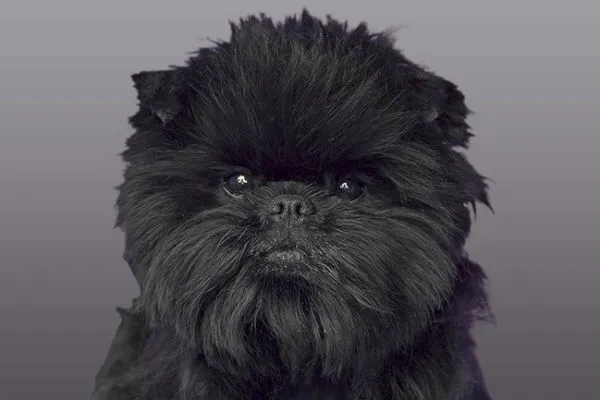 Affenpinscher dogThe Affenpinscher, meaning “monkey-like terrier,” lives up to its name with its intelligent and somewhat mischievous expression. This fearless toy breed is also known for its low shedding and minimal odor. Their wiry coat requires only a twice-weekly brushing with a slicker brush and comb to keep them looking neat. This breed is an excellent example of small dogs that don’t shed much, offering a humorous and devoted companion.
Affenpinscher dogThe Affenpinscher, meaning “monkey-like terrier,” lives up to its name with its intelligent and somewhat mischievous expression. This fearless toy breed is also known for its low shedding and minimal odor. Their wiry coat requires only a twice-weekly brushing with a slicker brush and comb to keep them looking neat. This breed is an excellent example of small dogs that don’t shed much, offering a humorous and devoted companion.
Basenji
The Basenji is often called the “barkless dog” due to its unique vocalizations, which sound more like a yodel or a chortle. For those who love hound traits but dislike the typical shedding and odor, the Basenji is a fantastic choice. They shed minimally, and their short, fine coat is easy to maintain with occasional brushing. Their need for daily exercise and playtime makes them active companions, though they are generally quiet indoors, making them suitable for apartment living.
Bichon Frise
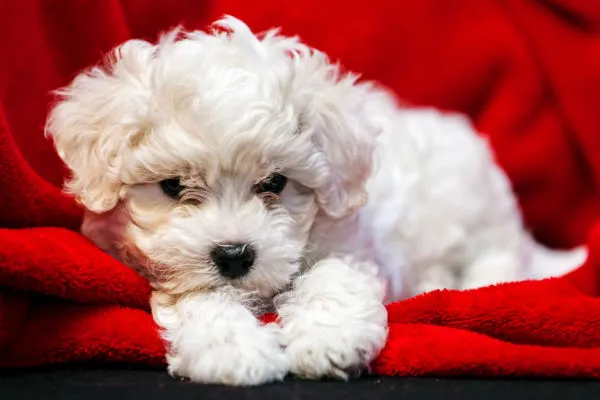 Bichon Frise dogThe Bichon Frise is celebrated as a truly non-shedding small dog breed, making them a top pick for individuals with allergies. These affectionate and playful dogs are known for their cheerful disposition. While they don’t shed much, their continuously growing hair does require frequent grooming and regular brushing to maintain their signature “powder-puff” appearance. This breed demonstrates that while shedding might be minimal, consistent grooming is key for a healthy coat.
Bichon Frise dogThe Bichon Frise is celebrated as a truly non-shedding small dog breed, making them a top pick for individuals with allergies. These affectionate and playful dogs are known for their cheerful disposition. While they don’t shed much, their continuously growing hair does require frequent grooming and regular brushing to maintain their signature “powder-puff” appearance. This breed demonstrates that while shedding might be minimal, consistent grooming is key for a healthy coat.
Bolognese
Similar to the Bichon Frise, the Bolognese boasts a distinctive fluffy coat that consists of hair rather than fur. This breed is another excellent example of small dogs that don’t shed. While they don’t shed dead hair excessively, it does need to be brushed out regularly. Daily grooming is recommended to keep their lovable coats in top condition.
Brussels Griffon
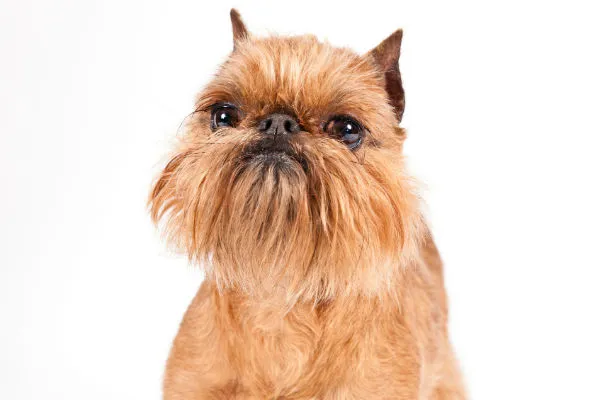 Brussels Griffon dogThe Brussels Griffon, available in both smooth-coated and rough-coated varieties, is a small dog that requires minimal pampering. They are minimal shedders and thrive with regular grooming. Their small size means their exercise needs can be met with daily walks and indoor play. This loyal breed does best when their families are home frequently, offering a devoted and low-maintenance companionship.
Brussels Griffon dogThe Brussels Griffon, available in both smooth-coated and rough-coated varieties, is a small dog that requires minimal pampering. They are minimal shedders and thrive with regular grooming. Their small size means their exercise needs can be met with daily walks and indoor play. This loyal breed does best when their families are home frequently, offering a devoted and low-maintenance companionship.
Chinese Crested
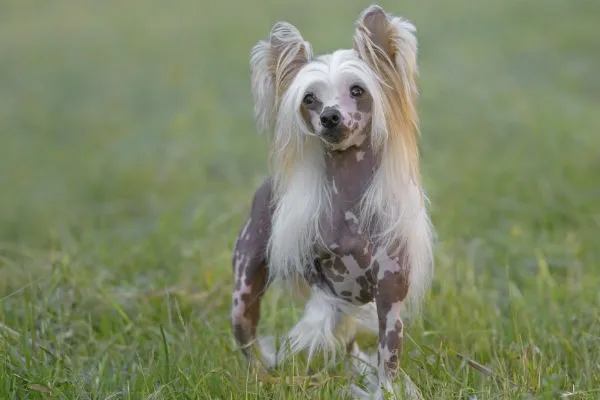 Chinese Crested dogOne of the most definitive ways to avoid shedding is to opt for a hairless breed. The Chinese Crested comes in two types: hairless and powderpuff. The hairless variety has hair only on its head, tail, and feet, while the powderpuff is covered in fine hair that sheds very minimally. Hairless Chinese Crested dogs require extra skin care, including protection from the sun and cold, and are more prone to skin irritations.
Chinese Crested dogOne of the most definitive ways to avoid shedding is to opt for a hairless breed. The Chinese Crested comes in two types: hairless and powderpuff. The hairless variety has hair only on its head, tail, and feet, while the powderpuff is covered in fine hair that sheds very minimally. Hairless Chinese Crested dogs require extra skin care, including protection from the sun and cold, and are more prone to skin irritations.
Coton De Tulear
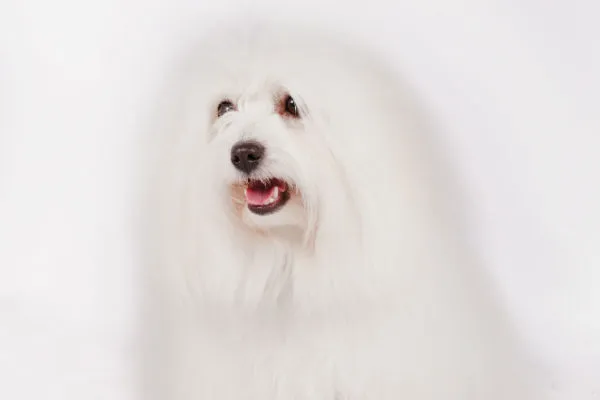 Coton de Tulear dogThe Coton de Tulear is characterized by its distinctive, long, fluffy coat, which is considered hypoallergenic. This makes it an excellent choice for allergy sufferers and those looking for small dogs that don’t shed. Daily grooming is essential to maintain their coats, but their gentle and lighthearted nature makes the effort highly rewarding.
Coton de Tulear dogThe Coton de Tulear is characterized by its distinctive, long, fluffy coat, which is considered hypoallergenic. This makes it an excellent choice for allergy sufferers and those looking for small dogs that don’t shed. Daily grooming is essential to maintain their coats, but their gentle and lighthearted nature makes the effort highly rewarding.
Havanese
These charming native Cuban dogs offer a spunky personality and a coat that sheds very little. This means less time spent dealing with hair on furniture and more time enjoying playtime with your Havanese. Their coat requires weekly brushing and regular baths to keep them clean and healthy.
Maltese
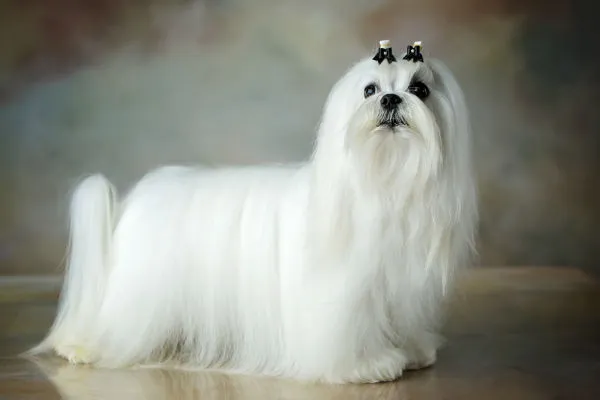 Maltese dogThe Maltese is an ancient breed known for its luxurious, long white coat that sheds very little, making it an ideal lap dog. Regular brushing is necessary to prevent matting, and occasional baths help keep their silky hair clean and free from debris. Their minimal shedding makes them a favored choice among small dogs that don’t shed.
Maltese dogThe Maltese is an ancient breed known for its luxurious, long white coat that sheds very little, making it an ideal lap dog. Regular brushing is necessary to prevent matting, and occasional baths help keep their silky hair clean and free from debris. Their minimal shedding makes them a favored choice among small dogs that don’t shed.
Lhasa Apso
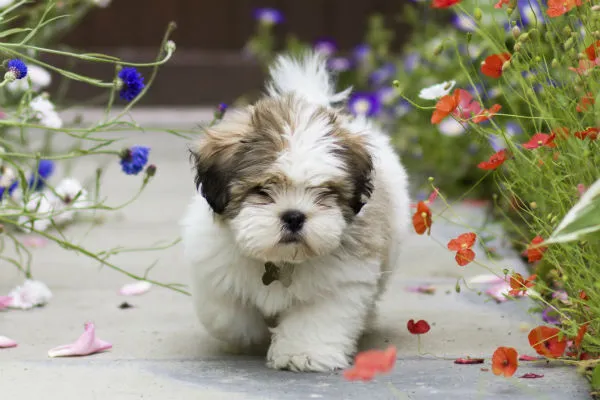 Lhasa Apso dogOriginating from Tibet, the Lhasa Apso makes an excellent, calm, yet playful companion. They do not shed, but their coats do require regular maintenance. Many owners opt for a shorter “puppy cut” to simplify grooming, avoiding the need for daily brushing of their long hair.
Lhasa Apso dogOriginating from Tibet, the Lhasa Apso makes an excellent, calm, yet playful companion. They do not shed, but their coats do require regular maintenance. Many owners opt for a shorter “puppy cut” to simplify grooming, avoiding the need for daily brushing of their long hair.
Miniature Schnauzer
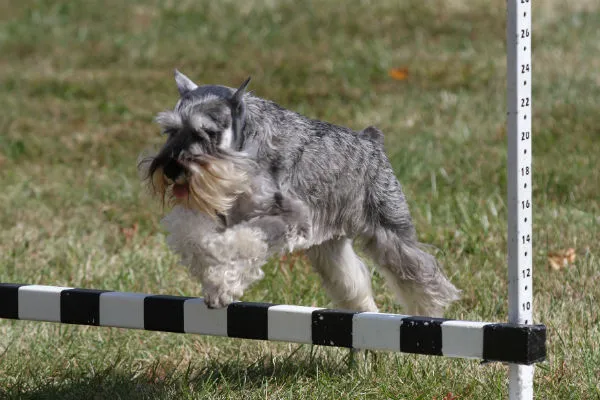 Miniature Schnauzer dogThe Miniature Schnauzer is an intelligent, cheerful, and trainable small dog that sheds very little. Their adaptable nature allows them to thrive in both city and country environments, provided they have their people close by. Weekly brushing and regular grooming are recommended to maintain their appearance.
Miniature Schnauzer dogThe Miniature Schnauzer is an intelligent, cheerful, and trainable small dog that sheds very little. Their adaptable nature allows them to thrive in both city and country environments, provided they have their people close by. Weekly brushing and regular grooming are recommended to maintain their appearance.
Poodle
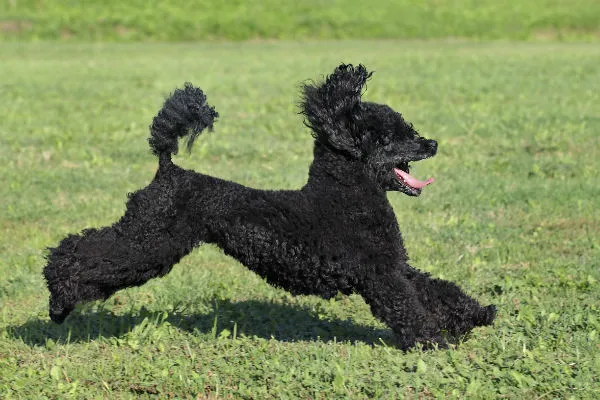 Poodle dogPoodles are perhaps the most well-known small dogs that don’t shed and are hypoallergenic. Available in Miniature and Toy sizes, they offer intelligence and a low-shedding coat in a petite package. All Poodles are highly intelligent and easy to train, though their curly hair requires regular professional grooming.
Poodle dogPoodles are perhaps the most well-known small dogs that don’t shed and are hypoallergenic. Available in Miniature and Toy sizes, they offer intelligence and a low-shedding coat in a petite package. All Poodles are highly intelligent and easy to train, though their curly hair requires regular professional grooming.
Scottish Terrier
The Scottish Terrier, or Scottie, is a bold and confident breed with a big personality. Their wiry, weather-resistant coat sheds very little. However, they do require regular brushing, grooming, and occasional hand-stripping to maintain coat health and breed standard. Their clever and independent nature means owners need to be mindful of their strong prey drive.
Shih Tzu
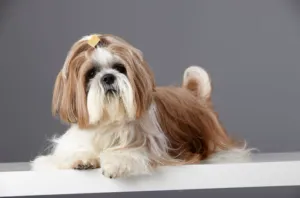 Shih Tzu dogThe Shih Tzu, historically favored by royalty, boasts a long, silky coat that is very low-shedding. Their hair, when brushed out, looks exceptionally regal. This sturdy and lively toy breed was bred to be a house pet and possesses a gentle, trusting nature, making them exceptional companions.
Shih Tzu dogThe Shih Tzu, historically favored by royalty, boasts a long, silky coat that is very low-shedding. Their hair, when brushed out, looks exceptionally regal. This sturdy and lively toy breed was bred to be a house pet and possesses a gentle, trusting nature, making them exceptional companions.
West Highland White Terrier
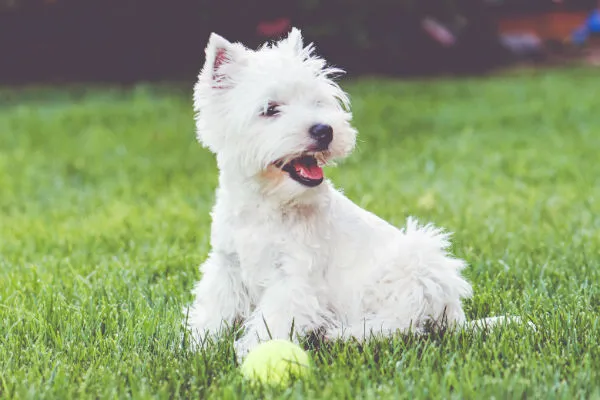 West Highland White Terrier dogThe West Highland White Terrier, affectionately known as a “Westie,” has a coarse, white coat that sheds very little. These sturdy dogs are intelligent, loyal, and entertaining. They possess moderate energy levels and an independent streak common to terriers, which can sometimes make training a challenge.
West Highland White Terrier dogThe West Highland White Terrier, affectionately known as a “Westie,” has a coarse, white coat that sheds very little. These sturdy dogs are intelligent, loyal, and entertaining. They possess moderate energy levels and an independent streak common to terriers, which can sometimes make training a challenge.
Xoloitzcuintli
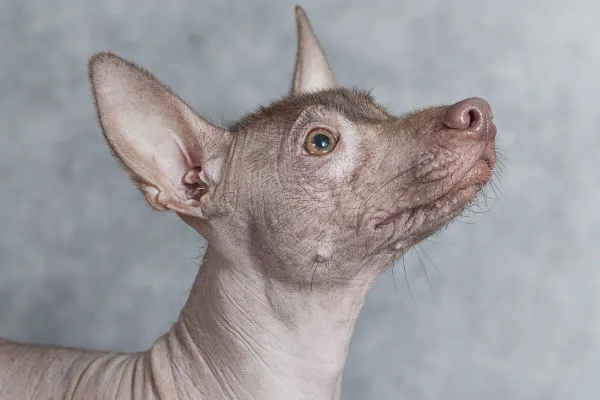 Xoloitzcuintli dogAlso known as the Mexican Hairless, the Xoloitzcuintli is an ancient breed with hairless and coated varieties. The coated variety has a very short, fine coat that sheds minimally. Hairless Xolos, like other hairless breeds, require extra attention to their skin for protection. They make attentive watchdogs and affectionate companions, known for their tranquil personality at home.
Xoloitzcuintli dogAlso known as the Mexican Hairless, the Xoloitzcuintli is an ancient breed with hairless and coated varieties. The coated variety has a very short, fine coat that sheds minimally. Hairless Xolos, like other hairless breeds, require extra attention to their skin for protection. They make attentive watchdogs and affectionate companions, known for their tranquil personality at home.
Yorkshire Terrier
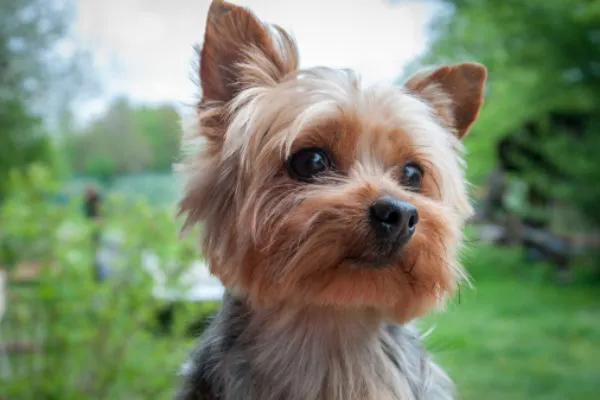 Yorkshire Terrier dogThe Yorkshire Terrier, or Yorkie, is a spirited, affectionate toy breed packed with personality. They do not shed, and their silky coats are beautiful when brushed daily, which is easily manageable due to their small size. Despite their elegant appearance, Yorkies have working-class roots as rat hunters, though they are equally content as lap dogs.
Yorkshire Terrier dogThe Yorkshire Terrier, or Yorkie, is a spirited, affectionate toy breed packed with personality. They do not shed, and their silky coats are beautiful when brushed daily, which is easily manageable due to their small size. Despite their elegant appearance, Yorkies have working-class roots as rat hunters, though they are equally content as lap dogs.
Other Small Dog Breeds That Don’t Shed (Much)
The Terrier group, in particular, is a treasure trove of small dogs that don’t shed or shed minimally. Wiry- and coarse-haired terriers generally shed less than other breeds, making them excellent choices for those seeking low-maintenance companions. If you are interested in exploring options beyond the breeds listed above, consider looking into other terrier varieties known for their low-shedding qualities.
When choosing from small dogs that don’t shed and are low maintenance, remember that “low maintenance” doesn’t mean “no maintenance.” All dogs require a commitment to their health, well-being, and socialization. Always research breeds thoroughly to ensure a good match with your lifestyle and personality. Purchasing a dog from a reliable breeder, feeding a high-quality diet, and scheduling regular veterinary check-ups are crucial steps to ensure your new companion stays healthy and happy.
References
- American Kennel Club (AKC). (n.d.). Dog Breeds. Retrieved from https://www.akc.org/dog-breeds/ (Information on specific breeds including Affenpinscher, Basenji, Bichon Frise, Bolognese, Brussels Griffon, Chinese Crested, Coton de Tulear, Havanese, Maltese, Lhasa Apso, Miniature Schnauzer, Poodle, Scottish Terrier, Shih Tzu, West Highland White Terrier, Xoloitzcuintli, Yorkshire Terrier)
- AKC Marketplace. (n.d.). Puppies for Sale. Retrieved from http://marketplace.akc.org/puppies (General reference for breed-specific puppy searches as indicated in original article)
